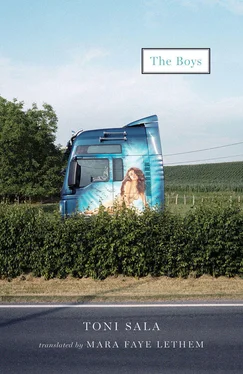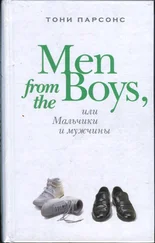It was the fault of sons of bitches like his father. Who had brand-new Ategos like the one in the poster? When he passed by a restaurant — a date-night restaurant, not like the cheap one on the side of the highway he went to the day before — and looked through the window, he only saw old people inside, big-bellied guys like the banker from Vidreres. How far was that guy, Ernest, from retirement? He could settle into a little house overlooking the sea to live out the rest of his years. But old folks don’t retire anymore. They had extended the retirement age. Why should they retire, when everything was hunky-dory? The old folks had good jobs and salaries, they had the dough, they had gotten there first. There are old people who are dirt poor, scum of the earth like his father, and there always will be, but what was over for good was young people with money or the possibility of making any. Everything was taken, starting with the illegal businesses. Sure, chicks could still be whores, being young was a definite advantage there, and the clever ones worked in secret like Marga and Cloe. But the restaurants he used to go to with his father every Sunday before the recession, had suddenly disappeared, the restaurants filled with young couples celebrating the signing of their forty-year mortgages, with tables reserved weeks in advance, the triumph of all that culinary crap, the chefs who were on TV every day, those bastards that served up mind-boggling dishes, who brought on mass poisoning with their white surgeons’ uniforms and Santoku knives, their cleavers and hands soaking wet from rummaging around in the guts of young people, their raw material, the base of their dishes, yes, the chefs were in on it, they were a key piece of the scam, they helped to cook the books. Until, all of a sudden, there were no more enology courses, no more silicone breast and lip implants for teenagers, no more trips to New York and the Caribbean for the kids, no more bricklayers’ assistants with 4x4s, no more everyone having a second home. The property that was supposed to ensure your future, in the end turned into a life sentence, the scam of the century. Everything was over for the young, just like that. They were as confident as their parents, but ended up being the butt of the joke — last one’s a rotten egg — and now the good cars were for the old, the cruises were for the old, the expensive clothing shops, the jewels, the spas, the massages, the high-class whores were for the old. The old folks had had their youth, but they’d had such a good time they’d come back for seconds, and thirds, and keep coming back for more. They were living their thousandth youth; they were bombproof, they’d aged well but hadn’t done anything more, squandering money like the young — they were role models in that — but the properties, the businesses, the companies, the posts, and the banks were theirs. They were living it up right in front of the noses of their children, grandchildren, and great-grandchildren. Because they could. They’d leave their bones as an inheritance. Farewell and good-bye. You can have this piece-of-shit world, here’s your embezzlement, your ruined country, the political system we turned into a fucking cage, ten thousand Fukushimas, and a hundred thousand warehouses of mortal remains. You can keep it, enjoy! Farewell and screw you! Those two poor kids from the car wreck had gotten out in time. There was that. Old folks who would launch a nuclear holocaust if they knew they had to die tomorrow. Die. Them? No fucking way were they gonna die. They wouldn’t die tomorrow. They wouldn’t ever die, the kings of the world would survive like roaches and rats, you’d find them everywhere; two kids cash in their chips against a tree on the side of the road, and who do you find there the next day, pondering it, musing over it, philosophizing? A banker. Then who shows up, on foot, brimming with life, getting a little exercise like someone going to the gym, with his cane and his stories from the Pleistocene epoch? Some three-hundred-year-old piece of shit. Every new medicine extends old people’s lives, so they have time to find another cure to keep them alive until the next discovery. They run the pharmaceutical industry, they specialize in defeating the cancers of old age, geriatric oncology was making leaps and bounds, eternally healthy prostates, skin, breasts, and colons, replacement parts; soon they’d cure Alzheimer’s; soon the old would watch the young pass them by, soon the young would be the old and the old would be the young — thirty-two-year-old old people, like him, trying to survive by rummaging through the dump, wrinkled by unemployment and bad news, gutted, playing dominoes on the Internet while outside hundred-year-old young people sunbathed all day long, and spent their nights leaping and dancing in the discos — when you see someone with tender skin and impeccable teeth, colorful clothes, long, shiny hair, full of health and joie de vivre, they’ll be old. Everything will be the same as ever, but with the young watching from the margins with their hands out. The old get beauty treatments and operate on their faces and breasts, they go to the gym, they take Viagra, they reproduce on their own — sixty-year-old women with kids, ninety-year-old grandmas buying wombs for hire or even giving birth themselves — they haven’t renounced anything. And the day they discover an immortality pill they can get rid of the young without regrets. They’ll have gotten what they wanted. It’s a fact of life, they will say, the planet has to regulate itself, there isn’t room for everyone, and our font of experience is essential. Then the young will just be in the way; they should have been prepared. It was only a question of time. They’re in charge, and the young are just some poor aliens; they control the governments and they run the system, they would get rid of the young without a second thought.
He picked up the shotgun and aimed it at the bedroom door. His old man was on the other side, lying in bed with his eyes open, waiting for him to finally leave. The music from the television slipped out under the door. His father was slow and silent, every day he walked, shoeless, in pajamas and socks, to the bathroom, before getting dressed. If he opened the door now he’d find a barrel in his face. He would have another heart attack. Would anything really change if he were in a wheelchair? Or would it be worse?
He could play like that with his father and yet didn’t abandon him, didn’t disappear and let him die alone, peacefully. He had the feeling that he wasn’t completely in control of the extremes, that he only had a handle on what was within certain limits. Both kindness and wickedness lay outside of his jurisdiction. But that didn’t mean they weren’t there: they had ways of crossing the border on their own, they knew hidden paths, secret tunnels, they entered him illegally, saints disguised as Adolf Hitler, scorpions among the harmless silverware in the kitchen drawer, and he didn’t realize until it was too late.
His father’s story wouldn’t end well. Knowing the end, why continue? He pulled two shells out of his pocket and loaded the shotgun. The cartridge cap was dented; the gun was at least twenty years old.
You made me and raised me; you are responsible for me.
He kept aiming until his arms got tired. Then he lowered the shotgun and put it back down on the table. There was a bit of thick yellowish sludge at the bottom of his mug, a sweet paste that would have to be poured down the drain.
“Papa,” he said, without raising his voice. “I’m off. I’ll leave this for you on the table.”
He only meant the shotgun, but animals sense danger. It rains and the snails come out of their holes, to save themselves from the water, they climb up plants, little birds chirp nonstop as they fall from their nest, and even a shitty little ant will spin around like a lunatic when it senses death. His father had heard him, he was old not stupid, and the door opened.
Читать дальше












